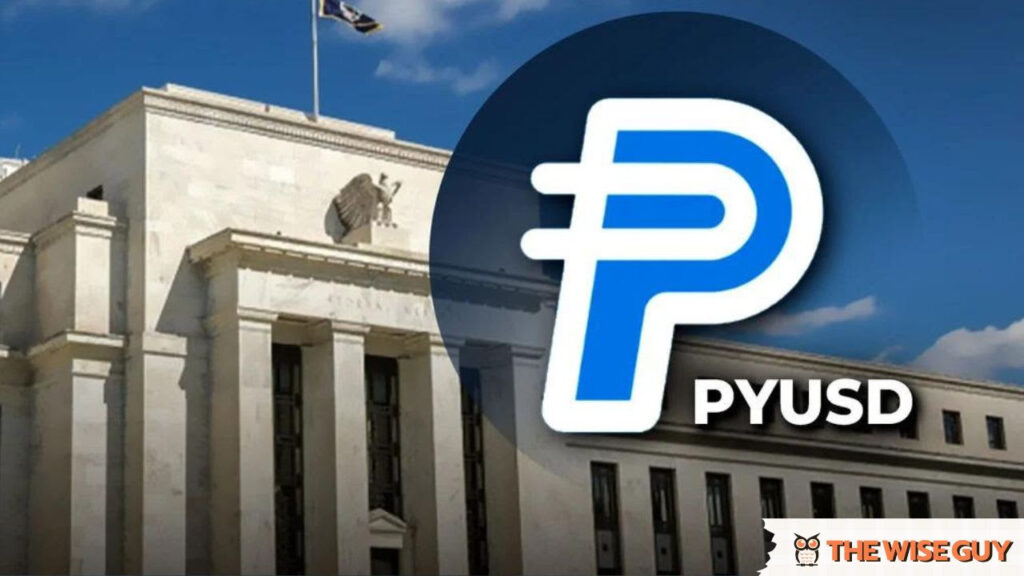???? GM,
Grab your favorite beverage (even if it’s a little early, we won’t tell), and get ready for the juiciest headlines that have been lighting up the Internet this week! ????
 Sam Bankman-Fried’s Future: Medium-Security Prison in California
Sam Bankman-Fried’s Future: Medium-Security Prison in California
 Marathon Digital Pilots Methane-Based Bitcoin Mining Project in Utah
Marathon Digital Pilots Methane-Based Bitcoin Mining Project in Utah
 SEC Scrutinizes PayPal’s Stablecoin PYUSD
SEC Scrutinizes PayPal’s Stablecoin PYUSD
 Editor’s Wrap: Crypto and Terror Finance — Separating Fact from Fiction
Editor’s Wrap: Crypto and Terror Finance — Separating Fact from Fiction

Sam Bankman-Fried’s Future: Medium-Security Prison in California

After a guilty verdict in his criminal trial, Sam Bankman-Fried, the crypto mogul behind FTX, is facing the prospect of spending the coming decades in a medium-security prison in California. This news marks a darker chapter in his life, as his rise and fall in the world of crypto exchange FTX culminate in a narrative conclusion.
Question 1: Where will Sam Bankman-Fried be sent to prison?
According to legal consultant Christopher Zoukis, based on the facts of Bankman-Fried’s case, he is most likely to be sent to a medium-security federal prison in California. This choice is influenced by the potential length of his sentence and his previous residence under house arrest in Palo Alto. However, this news is not necessarily positive for the one-time billionaire.
Question 2: What are the conditions like in medium-security federal prisons? Medium-security federal prisons house inmates with longer prison sentences or more severe records. These facilities are known for their heavily guarded cells and a higher risk of violence. Notably, Zoukis highlights that West Coast medium-security prisons tend to have more gang involvement and prison politics compared to their East Coast or mid-Atlantic counterparts.
Question 3: Which specific medium-security federal prisons are possible options?
Zoukis suggests that Bankman-Fried may be sent to FCI Herlong, FCI Mendota, or USP Lompoc. However, recent shifts in the reputation of some of these prisons have made them less livable and potentially dangerous. It is important to note that attempts to influence initial prisoner designations by the Bureau of Prisons are rarely successful.
Question 4: Could Bankman-Fried’s requests for special accommodations be granted?
Bankman-Fried’s legal requests for Adderall and vegan food are unlikely to meet the criteria for influencing the Bureau of Prisons. Zoukis doubts that these requests, even with supporting reasons, will be successful. It is probable that Bankman-Fried may have to part ways with his comfortable lifestyle and accept the limited options available in prison.
Marathon Digital Pilots Methane-Based Bitcoin Mining Project in Utah

Marathon Digital, a Bitcoin mining company, has launched a pilot project in Utah that utilizes methane gas from landfill waste to generate electricity for its mining operations. In collaboration with renewable energy firm Nodal Power, Marathon aims to assess the feasibility and potential of this methane-based energy solution for future expansion.
Sustainable Bitcoin Mining with Landfill
Methane Marathon’s test project is part of a broader initiative to capture methane emissions from landfills and convert them into electricity to power Bitcoin miners. By utilizing this harmful gas, Marathon aims to contribute to clean and renewable energy sources.
Following a Trend of Alternative Energy Solutions
Marathon is not the first mining company to explore alternative energy sources to power their operations. Last year, startup Vespene Energy raised funds to mine Bitcoin using a similar energy source. Other companies, like Crusoe Energy, have built remote facilities that harness otherwise wasted natural gas for mining, reducing methane emissions into the atmosphere.
Mitigating Methane’s Environmental Impact
Methane gas is known to have a significantly higher environmental impact than carbon dioxide. According to the United Nations Environment Programme (UNEP), methane is 80 times more harmful than carbon dioxide for the first 20 years after its release. By converting landfill methane into electricity, Marathon aims to reduce methane emissions, which accounted for approximately 14.3% of all methane emissions in the United States in 2021, according to the Environmental Protection Agency (EPA).
Marathon’s Commitment to Innovation and Sustainability
Marathon Chairman and CEO Fred Thiel expressed the company’s dedication to diversifying operations, lowering energy costs, and leveraging Bitcoin mining’s unique aspects to benefit the environment. Thiel sees the methane-based project as an opportunity to achieve these goals simultaneously.
SEC Scrutinizes PayPal’s Stablecoin PYUSD

The U.S. Securities and Exchange Commission (SEC) has requested documents regarding PayPal’s newly introduced stablecoin, PYUSD.
This move signals the SEC’s continued crackdown on the cryptocurrency industry under the leadership of Chairman Gary Gensler. The SEC’s recent actions, including its lawsuit against the BUSD stablecoin issued by Paxos on the Binance platform, have raised eyebrows, with some claiming that the regulator is favoring certain players in the emerging crypto landscape. This newsletter delves into the implications of the SEC’s request and explores the broader context of stablecoins in the crypto market.
Regulatory Pressure on PayPal
PayPal, a major fintech player, was one of the first to venture into the stablecoin space, launching PYUSD during a time of crypto market downturn. This move not only demonstrated the company’s support for blockchain technology but also presented an opportunity to increase global demand for U.S. dollars. Despite complying with regulations overseen by the New York Department of Financial Services, PayPal now faces scrutiny from the SEC. This development has led to speculation on the motives behind the SEC’s actions, considering the increasing significance of stablecoins in the crypto market.
Controversies Surrounding Stablecoins
Stablecoins have become a contentious topic for U.S. lawmakers and regulators, attracting attention for being pegged to fiat currencies such as the U.S. dollar. Representative Maxine Waters, formerly the head of the House Financial Services Committee, expressed concerns about PYUSD and called for federal oversight to ensure proper regulation. However, there are differing opinions on whether stablecoins, including PYUSD, should be categorized as securities. The so-called “Howey Test,” used by the SEC to evaluate securities, might not be applicable in this context, given the unique nature of stablecoins.
Examining the SEC’s Perspective
Legal experts have analyzed the SEC’s potential argument by questioning the concept of a “collective enterprise” and the expectation of profits. While PayPal and Paxos have a joint arrangement to issue PYUSD, they are responsible for the overall effort. Moreover, the source of external funds invested in the stablecoin is derived from users who exchange money with PayPal to acquire the stablecoin. This raises the question of whether the SEC’s classification of stablecoins as securities is justified or overly broad.
The Challenge of Defining Boundaries
The vague and subjective nature of the Howey Test has led to debates about where to draw the line between securities and other financial instruments. Critics argue that almost any purchase that has the potential to generate profit, including assets like fine art or collectible sneakers, could fall under the purview of securities regulation. Recognized legal experts have raised similar concerns, emphasizing the need to establish clear boundaries to prevent excessive regulatory expansion.

Editor’s Wrap: Crypto and Terror Finance — Separating Fact from Fiction

Questioning Misinformed Claims
Misleading reports have emerged, suggesting that cryptocurrencies facilitate substantial terrorism funding. However, reliable sources such as Chainalysis and Elliptic refute these assertions, stating that there is limited evidence to support significant crypto donations to terrorist organizations like Hamas. The focus on crypto terrorism financing distracts from addressing the root causes of these crimes.
Identifying the Real Funding Sources
Rather than solely relying on cryptocurrencies, terrorist organizations rely on traditional means of funding, such as taxes, financial aid, and donations. Hamas, for example, generates most of its funding through fiat channels, despite being subject to sanctions and restrictions from the global banking system. Holding accountable those involved in illicit financing, regardless of the payment method, is crucial to combating terrorism effectively.
Cryptocurrency Industry as a Scapegoat
The failures of mainstream financial institutions in compliance and sanction enforcement far outweigh any shortcomings in the emerging crypto industry. Traditional banks have faced substantial fines for facilitating illicit transactions, while crypto’s decentralized nature provides enhanced transparency and tracking capabilities. Painting the entire crypto industry with a broad brush unfairly scapegoats a technology that can contribute to identifying and combating illicit transactions more effectively.
The Power of Blockchain
Analytics Blockchain analytics firms, equipped with advanced technology, offer valuable tools to identify and disrupt illicit flow of funds. Research from Chainalysis suggests that just a minuscule percentage (0.24%) of blockchain transactions in 2022 were illicit. Public blockchains provide law enforcement and intelligence agencies with crucial intelligence for tracing the source of illegal funds. Illicit actors tend to operate in the depths of the Deep and Dark Web, rather than exclusively relying on blockchain platforms.
A Balanced Perspective
While some politicians may seek to regulate or condemn the crypto industry, it is essential to avoid demonizing technology as a whole. Mobile phones and the internet have been exploited by terrorists for their activities, yet they have not faced calls for eradication. Blockchain technology holds promise in facilitating transparent transactions and enhancing financial security. Instead of blaming the technology, policymakers should focus on enforcing laws against those directly involved in funding terrorism.
CoinWestern Quixplaned????
????Tesla’s $312M Bitcoin hoard remains untouched in Q3 2023
????Binance sees over $500M withdrawn amid ongoing regulatory troubles
????Dubai investor rues early exit from Shiba Inu investment; misses out on $70 million
Top Reddits This Week That Got Our Attention
JPMorgan says Ethereum’s activity post-Shanghai upgrade has been ‘disappointing’
I made new art for the Bitcoin Crab Market
Shrinkflation: a subtle way to hide inflation
Twice weekly crypto goodness, coming your way! Catch us every Tuesday and Friday. Mondays, read our All-In-One crypto newsletter. And hey, don’t forget to check us out on Wednesdays for all the latest AI news – because why limit yourself to just one kind of intelligence?


